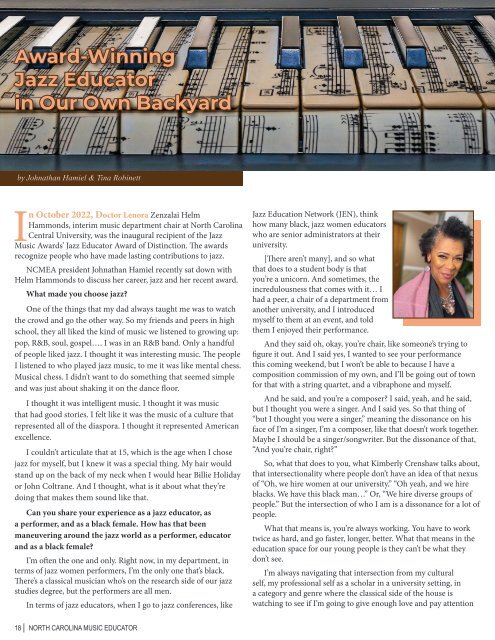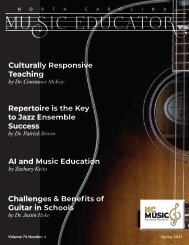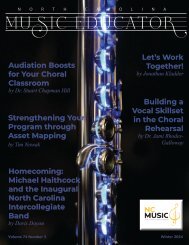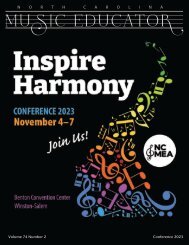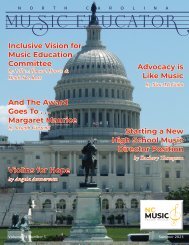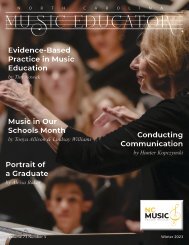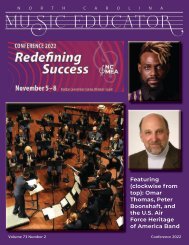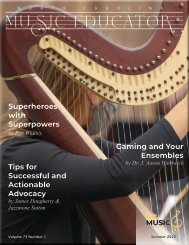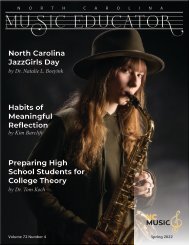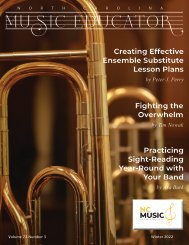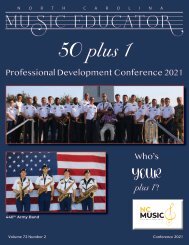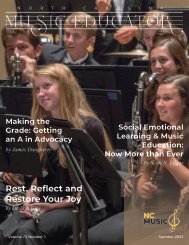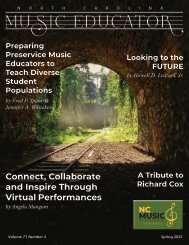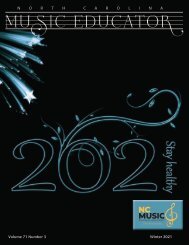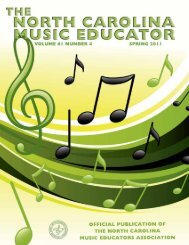Spring 2023
North Carolina Music Educator Journal Spring 2023
North Carolina Music Educator Journal Spring 2023
You also want an ePaper? Increase the reach of your titles
YUMPU automatically turns print PDFs into web optimized ePapers that Google loves.
Award-Winning<br />
Jazz Educator<br />
in Our Own Backyard<br />
by Johnathan Hamiel & Tina Robinett<br />
In October 2022, Doctor Lenora Zenzalai Helm<br />
Hammonds, interim music department chair at North Carolina<br />
Central University, was the inaugural recipient of the Jazz<br />
Music Awards’ Jazz Educator Award of Distinction. The awards<br />
recognize people who have made lasting contributions to jazz.<br />
NCMEA president Johnathan Hamiel recently sat down with<br />
Helm Hammonds to discuss her career, jazz and her recent award.<br />
What made you choose jazz?<br />
One of the things that my dad always taught me was to watch<br />
the crowd and go the other way. So my friends and peers in high<br />
school, they all liked the kind of music we listened to growing up:<br />
pop, R&B, soul, gospel…. I was in an R&B band. Only a handful<br />
of people liked jazz. I thought it was interesting music. The people<br />
I listened to who played jazz music, to me it was like mental chess.<br />
Musical chess. I didn’t want to do something that seemed simple<br />
and was just about shaking it on the dance floor.<br />
I thought it was intelligent music. I thought it was music<br />
that had good stories. I felt like it was the music of a culture that<br />
represented all of the diaspora. I thought it represented American<br />
excellence.<br />
I couldn’t articulate that at 15, which is the age when I chose<br />
jazz for myself, but I knew it was a special thing. My hair would<br />
stand up on the back of my neck when I would hear Billie Holiday<br />
or John Coltrane. And I thought, what is it about what they’re<br />
doing that makes them sound like that.<br />
Can you share your experience as a jazz educator, as<br />
a performer, and as a black female. How has that been<br />
maneuvering around the jazz world as a performer, educator<br />
and as a black female?<br />
I’m often the one and only. Right now, in my department, in<br />
terms of jazz women performers, I’m the only one that’s black.<br />
There’s a classical musician who’s on the research side of our jazz<br />
studies degree, but the performers are all men.<br />
In terms of jazz educators, when I go to jazz conferences, like<br />
Jazz Education Network (JEN), think<br />
how many black, jazz women educators<br />
who are senior administrators at their<br />
university.<br />
[There aren’t many], and so what<br />
that does to a student body is that<br />
you’re a unicorn. And sometimes, the<br />
incredulousness that comes with it… I<br />
had a peer, a chair of a department from<br />
another university, and I introduced<br />
myself to them at an event, and told<br />
them I enjoyed their performance.<br />
And they said oh, okay, you’re chair, like someone’s trying to<br />
figure it out. And I said yes, I wanted to see your performance<br />
this coming weekend, but I won’t be able to because I have a<br />
composition commission of my own, and I’ll be going out of town<br />
for that with a string quartet, and a vibraphone and myself.<br />
And he said, and you’re a composer? I said, yeah, and he said,<br />
but I thought you were a singer. And I said yes. So that thing of<br />
“but I thought you were a singer,” meaning the dissonance on his<br />
face of I’m a singer, I’m a composer, like that doesn’t work together.<br />
Maybe I should be a singer/songwriter. But the dissonance of that,<br />
“And you’re chair, right?”<br />
So, what that does to you, what Kimberly Crenshaw talks about,<br />
that intersectionality where people don’t have an idea of that nexus<br />
of “Oh, we hire women at our university.” “Oh yeah, and we hire<br />
blacks. We have this black man…” Or, “We hire diverse groups of<br />
people.” But the intersection of who I am is a dissonance for a lot of<br />
people.<br />
What that means is, you’re always working. You have to work<br />
twice as hard, and go faster, longer, better. What that means in the<br />
education space for our young people is they can’t be what they<br />
don’t see.<br />
I’m always navigating that intersection from my cultural<br />
self, my professional self as a scholar in a university setting, in<br />
a category and genre where the classical side of the house is<br />
watching to see if I’m going to give enough love and pay attention<br />
to everybody. My classical counterpart’s predecessors didn’t have<br />
to do that. They just had to not be a barrier, but they didn’t have to<br />
prove themselves.<br />
So I have to have the kind of countenance of I’m a human being<br />
who’s a musician. I’m a scholar and I’ve<br />
earned my work. That’s why I’ve pushed<br />
so hard to get my degree working full<br />
time. When I started as an adjunct<br />
A huge part of jazz is<br />
improvisation. What is the first<br />
thing you think about during an<br />
improvisation?<br />
The melody. Then I’m listening for<br />
who’s playing with me. So I know who’s<br />
going to respond with me.<br />
When you’re at a party, if you’re at a table, having drinks and<br />
food with friends, you start to match the energy of the way people<br />
are talking, what they’re talking about , how loud to be, if you laugh<br />
of whatever. You don’t just come in gangbusters and bring a whole<br />
different energy that doesn’t match.<br />
So beyond the melody, I’m listening to who my partners<br />
are, and then it’s what story do I want to tell? I think it’s terribly<br />
disrespectful to the audience to go in there ready, with a whole<br />
thing.<br />
Tell us about the Jazz Award, and what it felt like to win.<br />
I was astounded! It was the inaugural one, so it was really<br />
special to be the first one. But the Jazz Music Award is meant to<br />
UNCG Summer Music Camp<br />
Week 1: July 9–14, <strong>2023</strong> and Week 2: July 16–21, <strong>2023</strong><br />
Openings remain for select instruments. For more information<br />
and the online application, visit smcamp.uncg.edu.<br />
Audition Dates for <strong>2023</strong>–24<br />
December 2, <strong>2023</strong> February 10, 2024<br />
January 27, 2024 February 24, 2024*<br />
*priority deadline for scholarship/assistantship consideration<br />
Degree Programs<br />
Bachelor of Arts<br />
Bachelor of Music<br />
Music Minor<br />
Master of Music<br />
Doctor of Musical Arts<br />
Doctor of Philosophy<br />
Post-Baccalaureate Certificate<br />
Post-Masters Certificate<br />
be an answer to the GRAMMY awards, but for jazz artists. They<br />
organized the event in Atlanta and it felt like the Jazz GRAMMY’S.<br />
So to be the first one to receive the Jazz Educator Award of<br />
Distinction was amazing. It was surreal. So much so, that when<br />
I got the email, I read it quickly and<br />
thought they wanted me to present an<br />
award to someone.” And my husband<br />
said, “No, Lee, read it again. They’re<br />
giving you the award.” And I just wept.<br />
Being there was like being<br />
Cinderella. It was just amazing. After<br />
that, a lot of people… it’s so weird<br />
how getting an award like that, all of<br />
a sudden people take you a little more<br />
seriously. Or like I’ve been trucking<br />
along all this time. So it felt really good<br />
to be recognized for the work so far, four decades in.<br />
What performance are you most proud of, whether it’s your<br />
performance individually, or a student performance?<br />
My Vocal Jazz Ensemble performed at JEN a couple of years<br />
ago. The African American Jazz Caucus (AAJC) gave us the<br />
spotlight that year as the AAJC Spotlight Group. We had standing<br />
room only, and my students (from NCCU) showed out. They left<br />
no prisoners. Afterwards, our peers came up and said such great<br />
things. The elders in AAJC came up and said, “yes, you made us<br />
proud!” But those students showed them what it sounds like when<br />
you are proud of singing music from the diaspora. For my students,<br />
that was my favorite performance.<br />
18 | NORTH CAROLINA MUSIC EDUCATOR NORTH CAROLINA MUSIC EDUCATOR | 19


